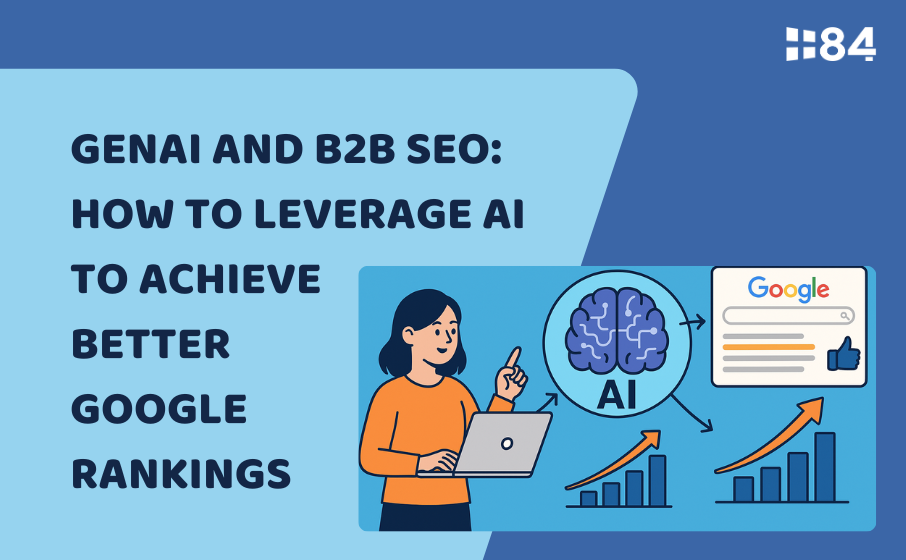In the current era of digital transformation, SEO (Search Engine Optimization) plays a crucial role in B2B marketing strategies. To succeed in developing an effective SEO strategy, businesses need to continuously optimize and enhance factors related to online search. One emerging technology, Generative AI (GenAI), is helping businesses achieve better SEO results and improve their rankings on Google. In this article, we will explore how AI, particularly GenAI, can help optimize B2B SEO effectively.
The Role of GenAI in B2B SEO
SEO is a key component of any business’s marketing strategy, especially for B2B models, where purchasing decisions are often made by organizations or individuals who conduct thorough research. However, improving Google rankings is not a simple task. This is why AI technology, and especially GenAI, has been implemented to optimize content, conduct keyword research, and enhance search performance.
GenAI is an artificial intelligence system capable of automatically generating content and intelligently analyzing SEO factors. Integrating GenAI into B2B SEO strategies not only saves time but also delivers high efficiency in improving search rankings on Google.
Keyword Research with AI
Keyword research is an essential step in SEO strategy, especially for B2B businesses. Choosing the right keywords helps you reach the right target audience, increasing conversion opportunities and optimizing search effectiveness. Previously, keyword research was a time-consuming process, requiring the analysis of large amounts of data and search trends. However, with AI assistance, this process has become much faster and more accurate.
By using AI, businesses can analyze search data from tools like Google, Bing, and other search platforms. AI helps identify high-volume keywords relevant to your industry, enabling you to optimize your SEO strategy effectively. One of GenAI’s strengths is its ability to automate keyword analysis. Instead of spending time on manual research, AI can quickly identify potential keywords, allowing you to build a targeted SEO strategy and save costs.

Not only does AI analyze existing keywords, but it can also predict future search trends. Thanks to its ability to process and analyze big data, AI can highlight emerging keywords, helping businesses stay ahead of the curve in their optimization strategy. This not only ensures stable positioning on Google but also allows businesses to adjust their strategies in response to market changes, preventing them from falling behind in the competitive process.
Content Optimization with GenAI
In a B2B SEO strategy, high-quality content is not only vital for attracting customers but also plays a significant role in improving search rankings on Google. However, creating engaging, SEO-optimized content that provides real value to readers is not always easy. This is where GenAI comes into play.
With the ability to generate content automatically, GenAI assists businesses in producing blog posts, product descriptions, social media posts, and various other types of content without requiring excessive human intervention. This technology not only saves time but also ensures that the content is optimized according to Google’s key criteria.
Beyond content creation, GenAI also helps personalize the reading experience based on customer behavior analysis. By collecting and processing data on search habits, preferences, and interaction behaviors, GenAI can generate content tailored to specific target groups, boosting engagement and improving conversion rates.
With GenAI’s support, businesses can ensure that their content is always fresh, engaging, and meets search engine algorithm requirements, improving the chances of appearing on top search results pages.
Improving Search Performance with AI
In addition to generating quality content, AI helps businesses optimize their websites for higher Google rankings. This includes improving essential SEO factors both on-page (On-page SEO) and off-page (Off-page SEO).

1. On-page SEO Optimization
Have you ever noticed that some websites always appear higher on search results than others? This is due to their website optimization to align with Google’s ranking criteria. AI can help automatically adjust factors such as:
- Title: The first line you see in search results. AI helps create compelling titles that contain important keywords to attract readers.
- Meta Description: A brief description under the title in Google search results. AI can craft this description to be engaging and include key information.
- Heading Tags (H1, H2, H3, etc.): AI can organize headings logically, making the content more readable and helping Google better understand the page content.
- URL: AI can also generate concise, memorable URLs, giving the website a more professional appearance.
Thanks to AI, businesses can ensure that the content on their pages is always optimized according to Google’s standards, improving search rankings.
2. Improving Internal Links and Backlinks
In addition to on-page content optimization, the linking structure between pages also plays a crucial role in SEO. AI can enhance two main types of links:
- Internal Links: These are links between pages on the same website. For example, if you’re reading an article about “How to Optimize SEO,” AI may suggest linking to another relevant post like “Effective Keyword Research Strategies.” This helps readers easily find additional useful information and keeps them on the site longer.
- Backlinks: These are links from other websites pointing to yours. AI can analyze and identify reputable websites, suggesting where to build links to enhance the trustworthiness of your site on Google.
By optimizing the linking system, websites can increase visibility and improve search rankings.
3. Predicting Search Trends
One of the greatest benefits of AI is its ability to analyze vast amounts of data and predict what will become popular in the future. For example, if AI notices that more people are searching for “How to Use ChatGPT for Learning,” businesses can quickly create related content to attract more traffic.
Thanks to this predictive capability, AI helps businesses stay ahead of trends, create content that aligns with user needs, and ultimately improve SEO effectiveness and Google rankings.
Challenges and Considerations When Using AI in B2B SEO
While AI offers many benefits for SEO, it is not always flawless. When using AI to optimize content and search rankings, businesses must keep some important issues in mind to ensure the best results.
1. AI Data Needs to Be Accurate and Reliable
AI works based on data, similar to how a student learns from books and lectures. If the data AI is provided is flawed or inaccurate, the content generated will also be incorrect. Therefore, businesses need to carefully select and verify data before feeding it into the AI system.
2. Avoid Relying Completely on AI
AI can quickly generate content, but it cannot fully replace human creativity. A good article not only requires accurate information but also creativity and originality. Relying solely on AI without human review and editing can result in dry, generic content that resembles other articles online. Therefore, it is best to combine AI with human insight to create more engaging content.
3. Adhere to Google’s Guidelines
Google has strict rules for evaluating content quality. If AI generates content that is unnatural, overly copied, or lacks real value, Google may rank the website lower or even remove it from search results. Therefore, businesses must ensure that the content created by AI adheres to Google’s quality and originality standards.
Conclusion
GenAI opens up new opportunities for optimizing B2B SEO, helping businesses achieve high Google rankings effectively and sustainably. By leveraging AI for keyword research, content optimization, and improving SEO factors, businesses can enhance their marketing strategies and achieve impressive results.
However, implementing GenAI must be done carefully and thoughtfully to ensure accuracy and compliance with Google’s SEO principles. With the perfect combination of AI and intelligent SEO strategies, businesses can succeed in improving search rankings and effectively attracting potential customers.


